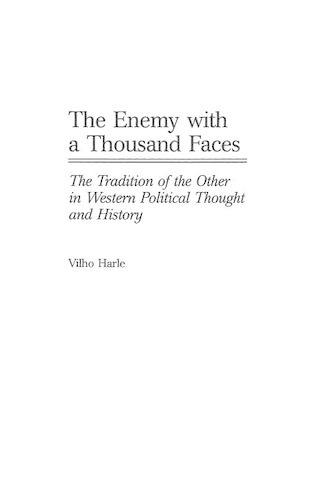
The Enemy with a Thousand Faces: The Tradition of the Other in Western Political Thought and History
(Hardback)
Publishing Details
The Enemy with a Thousand Faces: The Tradition of the Other in Western Political Thought and History
By (Author) Vilho Harle
Bloomsbury Publishing PLC
Praeger Publishers Inc
30th March 2000
United States
Classifications
Tertiary Education
Non Fiction
Political science and theory
History of ideas
Social and political philosophy
320.01
Physical Properties
Hardback
232
Width 156mm, Height 235mm
539g
Description
Harle examines how conflicts between "us" and "them" are often represented as the struggle between the representatives of good and representatives of evil. The origin of this tradition - the struggle between good and evil - is found in ancient Iranian Zoroastrianism, soon adopted by Judaism, Christianity, and finally, Islam. The political doctrine was born in Greece, where power struggles between the Greek city states, especially Athens and Sparta, were represented by Athenians as the struggle between "democracy" and "tyranny". In the Middle Ages the tradition was applied to, for example, Antichrists, rival faiths, witches, Jews, Russians and Muslims. In the modern world, examples of the tradition in American and Russian political cultures and politics, as well as Carl Schmitt's distinction between friend and enemy and its international implications, especially the EU, are examined. Finally, identity politics in Finland, Karelia and Lapland are presented as a problem of the definition of Europe. Harle claims that phenomena like ethnic conflicts, political extremism, neo-Nazism and anti-Semitism are nothing new and are not independent of one another; instead, as Harle shows, they are examples in a long chain of tradition and interconnected through that tradition. A provocative analysis for scholars and researchers in international relations, political history and the history of ideas.
Reviews
[t]hought-provoking, fascinating, stimuating and controversial in the best sense of the word. It deserves a wide audience and it deserves to be answered by new scholars, drawn into intellectual maelstrom it has generated.-Scandinavian Economic History Review
As an interesting catalog of ideas on the ways in which evil is represented in a variety of cultures, as manifest in the enemy, or Other, the book servies a useful purpose and is a valuable resource.-American Political Science Review
"thought-provoking, fascinating, stimuating and controversial in the best sense of the word. It deserves a wide audience and it deserves to be answered by new scholars, drawn into intellectual maelstrom it has generated."-Scandinavian Economic History Review
"As an interesting catalog of ideas on the ways in which evil is represented in a variety of cultures, as manifest in the enemy, or Other, the book servies a useful purpose and is a valuable resource."-American Political Science Review
"[t]hought-provoking, fascinating, stimuating and controversial in the best sense of the word. It deserves a wide audience and it deserves to be answered by new scholars, drawn into intellectual maelstrom it has generated."-Scandinavian Economic History Review
Author Bio
VILHO HARLE is Professor of International Relations at University of Lapland in Finland. He was a Visiting Fellow at the Centre for International Studies, the London School of Economics and Political Science in 1996-1997. Harle has authored or edited more than ten books and journal issues, including Ideas of Social Order in the Ancient World (Greenwood Press, 1998).
